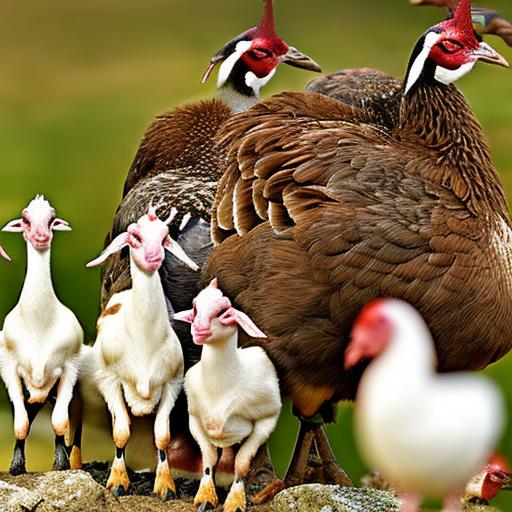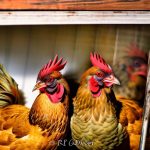Raising goats and chickens together has become a popular trend among homesteaders and backyard farmers. It offers a range of benefits, including mutual benefits for both animals and the opportunity to maximize the use of space and resources. By understanding the dynamics of goats and chickens and providing a safe and secure coop, it is possible to successfully raise these animals together.
Key Takeaways
- Raising goats and chickens together can provide numerous benefits, including pest control and fertilizer production.
- Understanding the natural dynamics between goats and chickens is important for creating a harmonious living environment.
- A safe and secure chicken coop is essential for protecting both goats and chickens from predators.
- Choosing the right size of chicken coop is crucial for ensuring adequate space and resources for both animals.
- Maintaining a clean and healthy living environment is key to preventing potential health issues and addressing challenges that may arise.
Benefits of Keeping Goats and Chickens Together
One of the main benefits of keeping goats and chickens together is their ability to help each other in terms of pest control, manure management, and more. Chickens are natural foragers and will eat insects, ticks, and other pests that may bother the goats. This can help reduce the need for chemical pest control methods. Additionally, goats produce a large amount of manure, which can be used as fertilizer for the garden or compost pile. Chickens can help break down the manure by scratching and pecking at it, speeding up the decomposition process.
Another benefit of keeping goats and chickens together is their ability to provide companionship for each other. Goats are social animals and enjoy having company. Chickens can provide this companionship, reducing stress and promoting overall well-being for the goats. Similarly, goats can help protect chickens from predators by acting as a deterrent. Their larger size and protective instincts can help keep predators at bay.
Understanding the Dynamics of Goats and Chickens
It is important to understand how goats and chickens interact with each other in order to successfully raise them together. Goats are curious animals and may try to nibble on chicken feathers or peck at their food. This behavior is usually harmless but may require some management to ensure the well-being of both animals. Chickens, on the other hand, may be intimidated by the larger size of goats and may need time to adjust to their presence.
It is also important to note that goats and chickens have different dietary needs. Goats are browsers and prefer to eat leaves, shrubs, and other vegetation. Chickens, on the other hand, are omnivores and require a diet that includes grains, seeds, insects, and kitchen scraps. Providing separate feeding areas for each animal can help ensure that they are getting the appropriate nutrition.
Preparing a Safe and Secure Chicken Coop
Having a secure coop is essential to protect goats and chickens from predators. Goats are more vulnerable to predators than chickens due to their larger size and slower speed. It is important to use sturdy fencing that is tall enough to prevent predators from jumping over or digging under. Additionally, the coop should have a secure door that can be locked at night to keep predators out.
To make the coop goat-proof, it is important to ensure that there are no gaps or holes in the fencing that goats can squeeze through. Goats are known for their ability to escape from enclosures, so it is important to regularly inspect the fencing for any weak spots or damage. Additionally, goats are notorious climbers, so it may be necessary to install a roof or cover over the coop to prevent them from escaping.
Choosing the Right Size of Chicken Coop for Goats and Chickens
When choosing the size of the coop, it is important to consider the number of goats and chickens that will be living together. Both animals require adequate space to live comfortably and exhibit natural behaviors. As a general rule of thumb, each chicken should have at least 4 square feet of space in the coop, while each goat should have at least 10 square feet of space.
It is also important to consider the height of the coop. Goats are excellent jumpers and climbers, so the coop should be tall enough to prevent them from escaping. A minimum height of 6 feet is recommended for goat-proofing the coop. Additionally, the coop should have enough roosting space for the chickens and separate areas for nesting and laying eggs.
Building a Chicken Coop Plan for Goats and Chickens

Building a coop that is suitable for both goats and chickens requires careful planning and consideration. It is important to choose materials that are sturdy and durable, as goats can be rough on structures. Pressure-treated lumber or metal framing can help ensure the longevity of the coop.
The coop should be divided into separate areas for goats and chickens. This can be achieved by using fencing or partitions to create separate spaces within the coop. The goat area should have a solid floor to prevent them from digging out, while the chicken area can have a dirt or straw floor.
Providing Adequate Space and Resources for Goats and Chickens
In addition to providing a secure coop, it is important to provide goats and chickens with adequate space and resources to live comfortably. Goats require access to fresh water, shelter from the elements, and a variety of vegetation to browse on. Chickens require access to fresh water, a balanced diet, and a safe place to roost and lay eggs.
It is important to provide enough space for both animals to move around freely. This includes providing enough room for goats to exercise and graze, as well as providing enough roosting space for chickens. Additionally, it is important to provide enough nesting boxes for the chickens to lay their eggs.
Maintaining a Clean and Healthy Living Environment for Goats and Chickens
Keeping the coop clean is essential for maintaining a healthy living environment for goats and chickens. Regularly cleaning out manure and soiled bedding can help prevent the buildup of bacteria and parasites. It is also important to provide fresh bedding material regularly to keep the coop clean and dry.
Regularly inspecting the coop for signs of pests or damage is also important. This includes checking for signs of mites, lice, or other parasites that may affect the health of the animals. If any signs of pests or disease are found, it is important to take appropriate measures to address the issue and prevent it from spreading.
Addressing Potential Challenges of Keeping Goats and Chickens Together
While keeping goats and chickens together can be beneficial, there are also potential challenges that may arise. One common challenge is the goats’ tendency to eat chicken feed. Goats are notorious for their ability to get into feed bins and will eat large quantities of chicken feed if given the opportunity. To prevent this, it is important to provide separate feeding areas for goats and chickens and ensure that the chicken feed is stored securely.
Another challenge is the potential for aggression between goats and chickens. While most goats and chickens will coexist peacefully, there may be instances where a goat becomes aggressive towards a chicken or vice versa. It is important to monitor their interactions closely and separate them if any aggression is observed.
Tips for Successfully Raising Goats and Chickens Together in a Chicken Coop
Raising goats and chickens together in a chicken coop can be a rewarding experience for homesteaders and backyard farmers. By understanding the dynamics of goats and chickens, providing a safe and secure coop, and addressing potential challenges, it is possible to successfully raise these animals together.
Some tips for successfully raising goats and chickens together include providing adequate space and resources, maintaining a clean and healthy living environment, and monitoring their interactions closely. With proper planning and management, raising goats and chickens together can be a mutually beneficial arrangement that maximizes the use of space and resources while providing companionship for both animals. So why not give it a try in your own backyard?
If you’re considering keeping goats and chickens together, it’s important to have a well-designed chicken coop and run that can accommodate both species. Poultry Wizard offers a comprehensive guide on chicken coop and run plans that can help you create a suitable living space for your animals. In addition, they also provide valuable insights on topics like chicken coop maintenance and design considerations specific to different locations, such as the chicken coop in Chester, SC. To learn more about creating a harmonious environment for your goats and chickens, check out their article on chicken coop and run plans.
FAQs
What are the benefits of keeping goats and chickens together?
Keeping goats and chickens together can provide several benefits. Goats can help control weeds and brush, while chickens can help control insects and pests. Additionally, their manure can be used as fertilizer for gardens and crops.
Is it safe to keep goats and chickens together?
Yes, it is generally safe to keep goats and chickens together. However, it is important to ensure that the animals have enough space and that their living areas are clean and well-maintained to prevent the spread of disease.
What should I consider before keeping goats and chickens together?
Before keeping goats and chickens together, it is important to consider the amount of space you have available, the type of fencing you will need, and the amount of food and water the animals will require. You should also research the specific needs and behaviors of each animal to ensure they are compatible.
What are some potential challenges of keeping goats and chickens together?
Some potential challenges of keeping goats and chickens together include the risk of disease transmission, the need for separate living areas to prevent aggression, and the potential for goats to eat chicken feed or harm chickens unintentionally.
What should I feed my goats and chickens?
Goats and chickens have different dietary needs. Goats require a diet that is high in fiber and low in protein, while chickens require a diet that is high in protein. It is important to provide each animal with the appropriate feed and to ensure they have access to clean water at all times.
Meet Walter, the feathered-friend fanatic of Florida! Nestled in the sunshine state, Walter struts through life with his feathered companions, clucking his way to happiness. With a coop that’s fancier than a five-star hotel, he’s the Don Juan of the chicken world. When he’s not teaching his hens to do the cha-cha, you’ll find him in a heated debate with his prized rooster, Sir Clucks-a-Lot. Walter’s poultry passion is no yolk; he’s the sunny-side-up guy you never knew you needed in your flock of friends!







